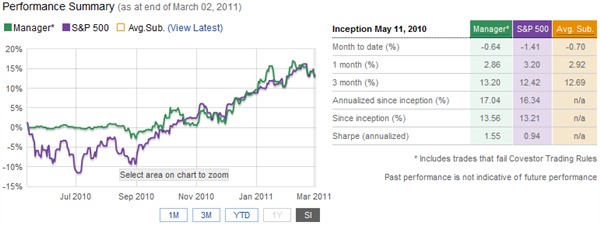 Author: Barry Randall, Crabtree Asset Management
Author: Barry Randall, Crabtree Asset Management
Covestor model: Crabtree Technology
Why did Google (GOOG) just announce the issuance of a class of stock with NO voting power? Why do rock stars marry supermodels?
Because they can.
When Google went public eight years ago, they did so with a dual-class structure that helped preserve the founders’ voting control over the company. So this recent development came as no surprise. In fact, given Sergey Brin and Larry Page’s famous self-absorption (e.g., “Do no evil”), it would come as no surprise to one day learn of an Onion-esque development whereby Google announces a special “class D” stock, the ownership of which requires you to pay Google a quarterly dividend. Hey, don’t laugh: that’s effectively what short-term Treasury bill investors are doing with inflation at 2%-3%.
But, you know, we’re dealing with geniuses here. I mean, wouldn’t you pay for the right to be associated with them?
The whole effort is a transparent attempt by Brin and Page to maintain their voting control over the company without having stock issued to employees slowly dilute their equity. The two men state as much in their “Founders’ Letter” as they describe why these new non-voting class C shares are being issued as part of a stock split:
“These non-voting shares will be available for corporate uses, like equity-based employee compensation, that might otherwise dilute our governance structure.”
A cynic could argue that given the founders’ existing 57.7% voting interest in the stock (via their super-voting class B shares), the current single-vote class A shares don’t really have any voting power anyway.
In a sense, what Google is doing is testing our concept of value. Since they aren’t paying dividends, your hope as a new shareholder is that the company will increase in value, and therefore your undiluted share in that value will increase. But right now, investors can only afford a share, or 100 or 100,000. But not the whole thing: Google’s market capitalization is around $200 billion , so no entity short of a sovereign nation could afford to buy it.
This means that Google — like Apple (AAPL)— has no call option premium built into its share price. Which makes its share price all the more impressive, and a reflection of the excellent job that its founders and now-Executive Chairman Eric Schmidt have done in leading the company since its inception in 1996. In that context, spending on seemingly outlandish ideas, like a money-losing two-year-old startup called YouTube, might seem prudent.
That’s all well and good while things are going swell. But what happens when enough of the crazy ideas (self-driving cars, space exploration, solar power plants in a world of cheap natural gas) start costing a little too much, and people start searching within the closed walls of Facebook a little too frequently, and Google stock starts going nowhere for a while? Like, say, the stock prices of Microsoft (MSFT), Yahoo (YHOO) and Cypress Semiconductor (CY), companies run by their over-controlling, genius founders with stock prices that have flat-lined for more than a decade?
Consider the difficulty that a powerful and successful investor like Daniel Loeb is having merely trying to get seats on Yahoo’s board, let alone effect meaningful change for the owners of the company. Fast forward a few years, and you can easily see Mr. Loeb or some other activist hedge fund manager training their guns on Google, tired of it sitting on tens of billions in cash with no plan to provide a return to its investors, only plans to teach sheep to knit sweaters from their own wool.
Part of me wonders if the whole thing isn’t some crazy experiment dreamed up by Google Labs. But then I remember all the rock stars, like Mick Jagger and Keith Richards, who eventually divorced their supermodel wives. Because they could.


